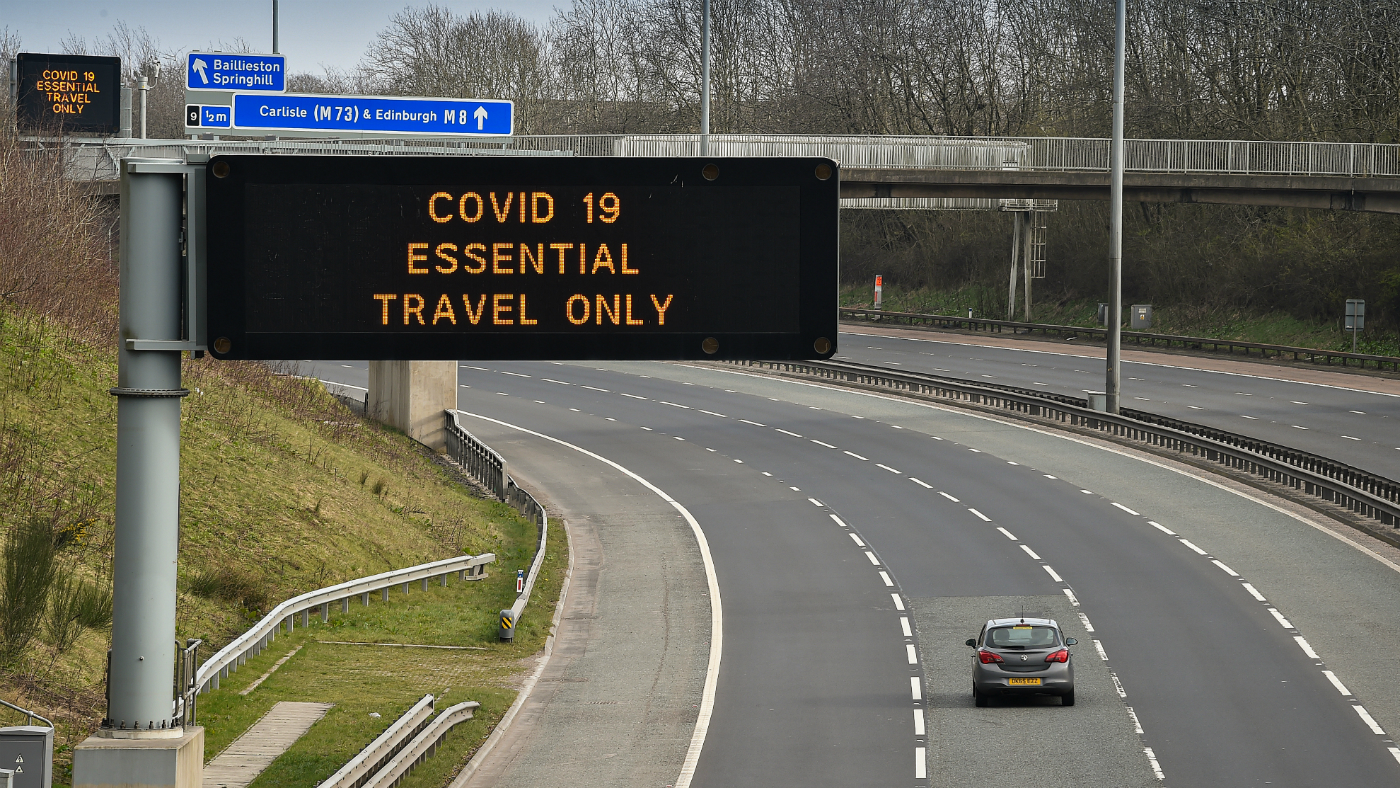Coronavirus: British environment flourishing during lockdown
New data shows huge drop in air pollution in UK cities

A free daily email with the biggest news stories of the day – and the best features from TheWeek.com
You are now subscribed
Your newsletter sign-up was successful
The UK coronavirus lockdown has resulted in significant drops in air pollution levels in cities across the country, newly released data shows.
Statistics from the Leeds-based National Centre for Atmospheric Science (NCAS) show marked reductions in levels of nitrogen dioxide (NO2) and particulate matter (PM2.5) in many urban areas, with levels of toxic pollutants expected to fall even further as the shutdown continues.
“If you look at traffic volumes, they’re still going down. And so we probably haven’t reached the bottom yet,” said NCAS director of science Professor Ally Lewis. “A few days ago, we were talking about journeys by car going down by about a third, and now it’s nearly a 50%-60% reduction.”
The Week
Escape your echo chamber. Get the facts behind the news, plus analysis from multiple perspectives.

Sign up for The Week's Free Newsletters
From our morning news briefing to a weekly Good News Newsletter, get the best of The Week delivered directly to your inbox.
From our morning news briefing to a weekly Good News Newsletter, get the best of The Week delivered directly to your inbox.
Why is pollution dropping?
The trend in the UK “mirrors that seen across continental Europe as people have spent less time in vehicles, offices and factories and more time at home” as a result of lockdown measures aimed at curbing the Covid-19 coronavirus pandemic, says the BBC.
Scientists have recorded an especially steep drop in levels of NO2, which is “produced from car engines, power plants and other industrial processes and is thought to exacerbate respiratory illnesses such as asthma”, explains The Guardian.
“While not a greenhouse gas itself, the pollutant originates from the same activities and industrial sectors that are responsible for a large share of the world’s carbon emissions and that drive global heating,” the newspaper adds.
A free daily email with the biggest news stories of the day – and the best features from TheWeek.com
Paul Monks, professor of air pollution at the University of Leicester, hopes that important lessons will be learned from what he describes as “the largest-scale experiment” ever seen on the effects of reducing these activities and industrial practices.
“Are we looking at what we might see in the future if we can move to a low-carbon economy? Not to denigrate the loss of life, but this might give us some hope from something terrible. To see what can be achieved,” Monks said.
So exactly what does latest data show?
The European Space Agency this week revealed that imaging from its Sentinel-5P satellite show that levels of NO2 over cities and industrial clusters in Asia and Europe over the past six weeks have been markedly lower than in the same period last year.
Meanwhile, the NCAS data reveals that in ten UK cities studied, NO2 levels dropped by around a third to a half compared with the yearly average in London, Birmingham, Bristol and Cardiff, with drops of between 10% and 20% recorded in the other cities: Belfast, Glasgow, Leeds, Manchester, Newcastle and York.
The figures also reveal that PM2.5 - formed as a result of burning fuel - is down by a third to a half in London, Birmingham, Bristol and Cardiff, and has dropped by about a quarter in Manchester, York and Belfast, with smaller declines in the other cities.
“The air is definitely much healthier,” said NCAS Professor James Lee. “These are big changes – pollution levels are the equivalent at the moment of a holiday, say an Easter Sunday.
“And I think we will see an even starker drop-off when the weather changes.”
The BBC’s science correspondent Jonathan Amos adds that “what will be interesting to see now is whether other pollutants follow the lead of NO2 and PM2.5”.
-
 Colbert, CBS spar over FCC and Talarico interview
Colbert, CBS spar over FCC and Talarico interviewSpeed Read The late night host said CBS pulled his interview with Democratic Texas state representative James Talarico over new FCC rules about political interviews
-
 The Week contest: AI bellyaching
The Week contest: AI bellyachingPuzzles and Quizzes
-
 Political cartoons for February 18
Political cartoons for February 18Cartoons Wednesday’s political cartoons include the DOW, human replacement, and more
-
 The environmental cost of GLP-1s
The environmental cost of GLP-1sThe explainer Producing the drugs is a dirty process
-
 The plan to wall off the ‘Doomsday’ glacier
The plan to wall off the ‘Doomsday’ glacierUnder the Radar Massive barrier could ‘slow the rate of ice loss’ from Thwaites Glacier, whose total collapse would have devastating consequences
-
 Can the UK take any more rain?
Can the UK take any more rain?Today’s Big Question An Atlantic jet stream is ‘stuck’ over British skies, leading to ‘biblical’ downpours and more than 40 consecutive days of rain in some areas
-
 As temperatures rise, US incomes fall
As temperatures rise, US incomes fallUnder the radar Elevated temperatures are capable of affecting the entire economy
-
 The world is entering an ‘era of water bankruptcy’
The world is entering an ‘era of water bankruptcy’The explainer Water might soon be more valuable than gold
-
 Climate change could lead to a reptile ‘sexpocalypse’
Climate change could lead to a reptile ‘sexpocalypse’Under the radar The gender gap has hit the animal kingdom
-
 The former largest iceberg is turning blue. It’s a bad sign.
The former largest iceberg is turning blue. It’s a bad sign.Under the radar It is quickly melting away
-
 How drones detected a deadly threat to Arctic whales
How drones detected a deadly threat to Arctic whalesUnder the radar Monitoring the sea in the air